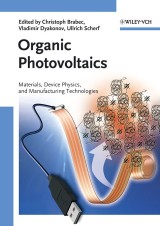Details

Organic Photovoltaics
Materials, Device Physics, and Manufacturing Technologies1. Aufl.
|
174,99 € |
|
| Verlag: | Wiley-VCH |
| Format: | |
| Veröffentl.: | 22.09.2011 |
| ISBN/EAN: | 9783527623204 |
| Sprache: | englisch |
| Anzahl Seiten: | 597 |
DRM-geschütztes eBook, Sie benötigen z.B. Adobe Digital Editions und eine Adobe ID zum Lesen.
Beschreibungen
Providing complementary viewpoints from academia as well as technology companies, this book covers the three most important aspects of successful device design: materials, device physics, and manufacturing technologies. It also offers an insight into commercialization concerns, such as packaging technologies, system integration, reel-to-reel large scale manufacturing issues and production costs. With an introduction by Nobel Laureate Alan Heeger.
Introduction<br /> I. MATERIALS FOR THIN FILM ORGANIC PV<br /> Donors<br /> - Polythiophenes and their PV Properties<br /> - Polyfluorenes and Fluorene-based Copolymers and their PV Properties<br /> - Low Bandgap Systems for Organic PV<br /> - Small Molecules for Organic PV<br /> Acceptors<br /> - Fullerenes<br /> - Polymeric Acceptors<br /> Solution Processable Nanoparticles and Sol Gel Materials<br /> - The Chemistry of Sol Gel ITO, TiOx, ZnOx as Photovoltaic Components<br /> - Inorganic Nanoparticles for Hybrid Solar Cells<br /> Transport Layers<br /> - PEDOT<br /> - PANI<br /> II. DEVICE PHYSICS OF THIN FILM ORGANIC PV<br /> Bulk Heterojunction Solar Cells<br /> - Overview of the State of the Art of Organic Solar Cells<br /> - Overview on the Photophysics of Organic Solar Cells<br /> - Device Physics of Organic Solar Cells<br /> - Transport Phenomena in Bulk Heterojunction Solar Cells<br /> - Morphology of Bulk Heterojunction Solar Cells<br /> Hybrid Solar Cells<br /> - TiOx Template /<br /> Polymer Solar Cells<br /> - TiOx and ZnO Bulk Heterojunction Solar Cells<br /> Small Molecule Multilayer Solar Cells<br /> - TiOx<br /> III. TECHNOLOGY FOR THIN FILM ORGANIC PV<br /> Electrodes for Thin Film PV<br /> - High Performance Electrodes<br /> - R2R Processing of Highly Conductive Metal Oxides<br /> - Novel Electrode Structures for Thin Film PV<br /> Packaging of Thin Film PV<br /> - Flexible Substrates Requirements for Organic Photovoltaics<br /> - Barrier Films for Photovoltaic Applications)<br /> Production of Thin Film PV<br /> - R2R Processing of Thin Film Organic Semiconductors<br /> - Costs, components and System Integration of Organic Photovoltaics<br /> New Concepts and Outlook<br /> - Limitations of Solid State Photovoltaics
"This book has a very good technical depth and, as such, will be worthwhile for researchers either entering the field of organic photovoltaics or for those already involved with organic photovoltair cell technology. Both will find this book to be an excellent resource of well-illustrated, clearly explained results from previous researchers." (IEEE Electrical Insulation Magazine, March/April 2009)
Christoph J. Brabec is director of the polymer photovoltaics programme at Konarka Technologies. After completing his Ph.D. in 1995, he joined the group of Prof Alan Heeger at the University of Santa Barbara, USA, for a sabbatical in 1996, and continued to work on the opto-electronic properties of organic semiconductors as assistant professor at the University of Linz with Prof. Serdar Sariciftci. In 1998, he became senior scientist of the Christian Doppler Laboratory on organic solar cells, which he left in 2001 to join Siemens Corporate Technology as project leader for organic semiconductor devices. He finished his habilitation in physical chemistry at the Johannes Kepler University of Linz in 2003, and is author and co-author of more than 100 papers and has filed over 30 patents.<br /> <br /> Vladimir Dyakonov is full professor of experimental physics at the University of Würzburg, Germany, and scientific director of the Bavarian Centre of Applied Energy Research (ZAE Bayern) in Würzburg. He obtained his diploma degree in physics from the University of Saint Petersburg, his Ph.D. from the A. F. Ioffe-Institute in Russia and his habilitation degree from the University of Oldenburg, Germany in 1986, 1996 and 2001, respectively. From 1996 to 1998, he worked as post-doctoral fellow at the universities of Antwerp, Belgium, and Linz, Austria.<br /> <br /> Ullrich Scherf is full professor for Macromolecular Chemistry at Bergische Universität Wuppertal, Germany. He studied chemistry at Friedrich Schiller University of Jena, Germany, obtaining his Ph.D. in 1988 and subsequently spent one year at the Institute for Animal Physiology of the Saxonian Academy of Sciences in Leipzig. He joined the Max Planck Institute for Polymer Research in Mainz in 1990 and completed his habilitation in 1996 on polyarylene-type ladder polymers. He followed a call to the University of Potsdam, Germany, onto a professorship for polymer chemistry. He has published over 350 refereed papers and received the Meyer-Struckmann Research Award in 1998.
Providing complementary viewpoints from technological companies as well as academia, this reference covers the three most important aspects of successful device design: materials, device physics, and manufacturing technologies. In so doing, it closes the gap between basic academic material and device research and the technologies relevant for product development, providing an insight into commercialization concerns, such as packaging technologies, system integration, reel-to-reel large scale manufacturing issues and production costs. With a contribution by Nobel Laureate Alan Heeger.


















